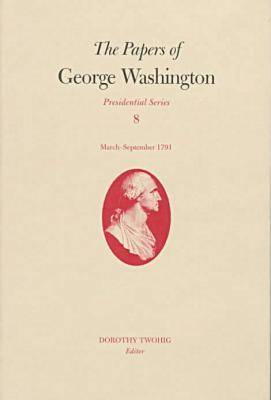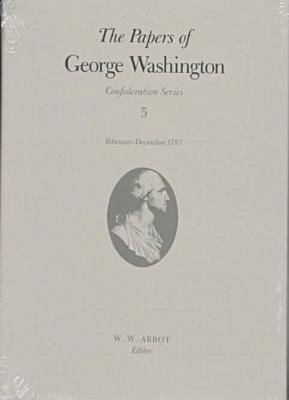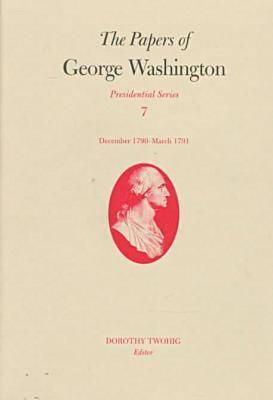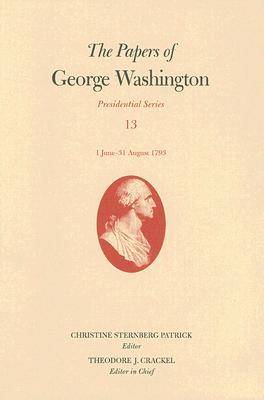Presidential
8 total works
The Papers of George Washington v.10; Presidential Series;March-August 1792
by George Washington
The Papers of George Washington v.8; March-Sepember, 1791;March-Sepember, 1791
by George Washington
n the period covered by volume 8 of the Presidential Series, the spring and summer of 1791, Washington completed a tour of the southern states, traveling almost 2,000 miles through Virginia, the Carolinas, and Georgia. During his journey the heads of executive departments regularly reported to him from Philadelphia on preparations for a major military expedition against hostile Indian nations along the northwestern frontier, a boundary dispute with the British on Lake Champlain, the negotiation of American loans in Amsterdam, and other affairs of state. Washington was also informed of the controversy occasioned by Thomas Jefferson's sponsorship of the first American edition of Thomas Paine's The Rights of Man.
After the president's return to the capital in early July, his official correspondence was concerned chiefly with planning the new federal district, a dispute between Pennsylvania and Virginia over an extradition case, and filling a seat on the Supreme Court and other vacancies, including postmaster general and U.S. auditor and comptroller. News of the slave uprising in Saint Domingue also reached Washington in September 1791. Friends and other foreign correspondents continued to send news from Europe, especially concerning affairs in revolutionary France.
The Papers of George Washington v. 11; Presidential Series;August 1792-January 1793
by George Washington
The Papers of George Washington Confederation Series, v.5;Confederation Series, v.5
by George Washington
The extensive correspondence regarding Shays' Rebellion and widespread alarm over the state of the Union continues in this volume, and there are the usual letters numbering in the hundreds which deal with his more personal concerns: farm and family, slave and tenant, tradesman and artisan. But the main focus of this volume is the Federal Convention in the summer of 1787 and the fight for ratification of the Constitution beginning in the fall of 1787. About these and other matters of importance Washington wrote to and heard from such Americans as Benjamin Franklin, Thomas Jefferson, James Madison, George Mason, Alexander Hamilton, John Jay, George Clinton, Gouverneur and Robert Morris, John Rutledge, William Moultrie, Christopher Gadsden, Noah Webster, Ezra Stiles, Charles Wilson Peale, and John Paul Jones; to and from such Europeans as Lafayette, Catherine Sawbridge, Macaulay Graham, Chastellux, Gardoqui, and La Luzerne. Of particular importance are Washington's exchanges regarding agricultural matters with Arthur Young, Thomas Peters, and a number of his fellow Virginia planters.
The Papers of George Washington v.6; Presidential Series;July-November 1790
by George Washington
During the period covered by volume 6, Washington's attention was devoted to several matters of great national significance. He signed the Residence and Funding Acts, authorizing a permanent new Federal City on the Potomac, establishing the seat of the federal government at Philadelphia until 1800, and creating a national debt by assuming the Revolutinary War debts of the states. Washington's official correspondence also shows his concern with Indian affairs, particularly his frustration with Brigadier General Josiah Harmar's punitive expedition in the Northwest Territory. Secretary of War Henry Knox's negotiations at New York with the southern Creeks loom large in the documents and annotation of early August 1790, which provide evidence of contemporary attitudes toward the Native American negotiators. Light is also shed on the intrigues of foreign agents on America's frontiers and in its capital as Spain and Great Britain appeared to drift toward war. The president's triumphal visit to Rhode Island in celebration of its ratification of the Federal Constitution is well documented. Washington's private correspondence with his secretary about remodeling the new presidential mansion and renovating his coach provides a detailed picture of high Federal culture and a glimpse of those whose livelihoods depended on serving the elite. Several requests for charity and numerous letters of application for federal office, particularly for posts in the newly created Revenue Cutter Service, describe the lives of various other ordinary American citizens.
The Papers of George Washington v.7; Presidential Series;December 1790-March 1791
by George Washington
Volume 7 of the series presents documents written during the final sessions of the First Congress, a period of intense activity for Washington and his administration. Between December 1790 and March 1791, Congress passed legislation that established a national bank and a dederal excise, incresed the size of the army, and provided for the admission of Vermont. Filling the offices created by these and other acts occupied much of Washington's attention; the excise service alone was one of the largest bureaucracies created during the Early Republic. The Indian war on the northwest frontier continued to be a major concern. Washington also devoted a large part of his time to the new Federal City on the Potomac. All of these activites were set against a background of increasing partisan division within the government, brought into high relief in February 1791 by the controversy over the bill to incorporate the Bank of the United states. George Wshington also devoted a part of his time during these months to planning his upcoming tour of the southern states. The volume closes on 21 March 1791, the day Washington left Philadelphia on the first leg of his triumphal Southern Tour.




